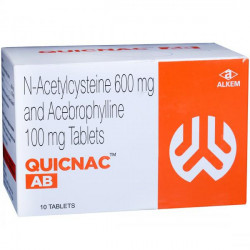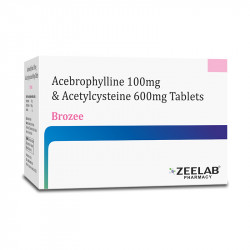Download India's most affordable pharmacy app
- Compare with medicine prices
- Save upto 90% on your medicine bills
COMPOSITION:
Acebrophylline (100mg) + Acetylcysteine (600mg)DESCRIPTION:
Quicnac AB Tablet contains Acebrophylline (100mg) and Acetylcysteine (600mg), a combination medicine used to treat respiratory conditions such as chronic obstructive pulmonary disease (COPD), chronic bronchitis, asthma, and other lung disorders associated with thick mucus and breathing difficulty. Acebrophylline acts as a bronchodilator and mucoregulator, relaxing airway muscles and reducing mucus thickness. Acetylcysteine works as a mucolytic, breaking down mucus structure, making it thinner and easier to expel. Together, they improve airflow, reduce cough frequency, and help clear mucus from the lungs, providing relief from congestion and breathing discomfort.
Not everyone taking Quicnac AB Tablet will experience side effects, but some may notice nausea, vomiting, stomach discomfort, dizziness, headache, or mild skin rash during treatment. These effects are generally mild and improve as the body adjusts. However, if symptoms persist or worsen, medical advice should be sought. The medicine should be taken exactly as prescribed by a doctor, preferably after meals to reduce stomach irritation. Tablets should be swallowed whole with water and not crushed or chewed. The dosage and duration of treatment depend on the severity of the respiratory condition and the patient’s medical history.
Avoid Quicnac AB Tablet if allergic to Acebrophylline, Acetylcysteine, or any of its components. Patients with active stomach ulcers, severe liver or kidney problems, low blood pressure, or certain heart conditions should inform their doctor before use. Pregnant and breastfeeding women should take it only if prescribed by a healthcare professional. Alcohol intake should be limited, as it may increase side effects like dizziness or stomach irritation. For best results, combine medication with breathing exercises, physiotherapy, and avoidance of smoking or environmental pollutants.
Uses of Quicnac AB Tablet
- Chronic Obstructive Pulmonary Disease (COPD): Improves airflow and clears thick mucus from the lungs.
- Chronic Bronchitis: Reduces mucus thickness and inflammation to ease coughing and breathing.
- Asthma: Relieves airway constriction and helps control symptoms like wheezing and breathlessness.
- Respiratory Infections with Excess Mucus: Helps loosen and expel mucus for better lung function.
Benefits of Quicnac AB Tablet
- Relaxes airway muscles to improve breathing.
- Breaks down and thins mucus for easier clearance.
- Reduces coughing and congestion.
- Improves lung function and oxygen intake.
How Quicnac AB Tablet Works
- Acebrophylline (100mg): Acts as a bronchodilator and anti-inflammatory agent by relaxing airway smooth muscles and regulating mucus production.
- Acetylcysteine (600mg): Works as a mucolytic by breaking the bonds in mucus, making it less viscous and easier to expel.
The combination helps reduce airway obstruction, improve mucus clearance, and enhance overall respiratory health.
How to Take Quicnac AB Tablet
- Take Quicnac AB Tablet exactly as prescribed by your doctor.
- Usually taken after meals to reduce the risk of stomach upset.
- Swallow the tablet whole with water; do not crush or chew.
- Avoid skipping doses for consistent relief.
- Follow breathing exercises and avoid irritants for best results.
Side Effects of Quicnac AB Tablet
Common side effects:
- Nausea or vomiting
- Stomach discomfort or heartburn
- Headache or dizziness
- Mild skin rash or itching
Serious side effects:
- Irregular heartbeat or chest pain
- Severe allergic reaction (swelling, difficulty breathing)
- Severe abdominal pain or signs of bleeding
- Unexpected worsening of breathing difficulty
Contact your doctor immediately if severe or persistent side effects occur.
Safety Advice
- Alcohol: Avoid alcohol as it may increase dizziness and stomach irritation.
- Pregnancy: Use only if clearly prescribed by a doctor after weighing risks and benefits.
- Breastfeeding: Limited data; consult a healthcare provider before use.
- Driving: Avoid driving if you feel dizzy or lightheaded.
- Kidney: Use with caution; dose adjustment may be necessary.
- Liver: Use with caution; regular monitoring may be needed in liver disease.
Frequently Asked Questions
Q: Can I take Quicnac AB Tablet on an empty stomach?
A: It is best taken after meals to avoid stomach irritation.
Q: Is Quicnac AB Tablet safe for long-term use?
A: It can be used long-term if prescribed, but regular monitoring is needed for safety.
Q: Can I stop taking Quicnac AB Tablet if I feel better?
A: No, complete the prescribed course to ensure proper mucus clearance and symptom control.
Q: Does Quicnac AB Tablet cause weight gain?
A: Weight gain is not a typical side effect.
Q: What should I do if I miss a dose of Quicnac AB Tablet?
A: Take it as soon as you remember unless it’s almost time for the next dose. Do not double the dose.
Q: Can Quicnac AB Tablet be taken with other respiratory medicines?
A: Yes, but only under medical supervision to avoid drug interactions.
Q: Are there any common side effects of Quicnac AB Tablet?
A: Yes, nausea, dizziness, and mild rash are common but usually temporary.
Q: Is Quicnac AB Tablet suitable for elderly patients?
A: Yes, but dosage adjustments and monitoring may be necessary.
Q: Can Quicnac AB Tablet be taken during pregnancy or breastfeeding?
A: Only if prescribed by a doctor after assessing risks and benefits.









 Added!
Added!